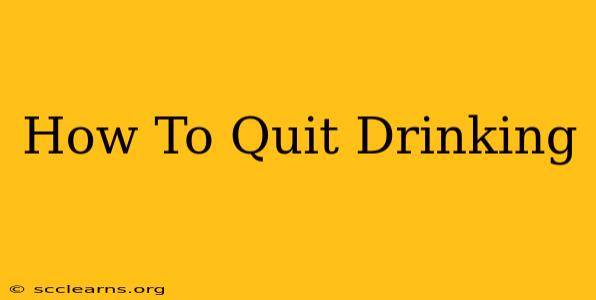Quitting drinking is a significant decision, and it's crucial to understand that it's a journey, not a destination. There's no one-size-fits-all answer, but this guide will equip you with the knowledge and strategies to navigate this process successfully. Whether you're looking to cut back or quit entirely, remember that seeking professional help is a sign of strength, not weakness.
Understanding Your Relationship with Alcohol
Before diving into the "how," let's address the "why." Honest self-reflection is paramount. Ask yourself:
- Why do you want to quit? Identifying your motivations – health concerns, relationship issues, financial problems, or simply a desire for a better life – will fuel your commitment.
- What role does alcohol play in your life? Is it a coping mechanism for stress, anxiety, or loneliness? Understanding this underlying function is key to finding healthier alternatives.
- How much do you drink? Tracking your consumption helps establish a baseline and monitor progress.
Steps to Quit Drinking
Quitting cold turkey can be challenging and potentially dangerous, especially if you're a heavy drinker. A gradual approach is often more effective and safer. Consider these steps:
1. Setting Realistic Goals
- Start small: Don't aim for complete abstinence overnight. Begin by reducing your daily or weekly intake. Set achievable milestones to avoid feeling overwhelmed.
- Identify your triggers: Recognize situations, emotions, or people that trigger your urge to drink. Develop strategies to avoid or manage these triggers.
- Find a support system: Lean on family, friends, or support groups like Alcoholics Anonymous (AA). Sharing your journey with others provides invaluable encouragement and accountability.
2. Seeking Professional Help
- Doctor's consultation: Your physician can assess your health status, advise on potential withdrawal symptoms, and recommend medication if necessary.
- Therapy: A therapist can help you explore the underlying causes of your alcohol use and develop coping mechanisms for managing cravings and triggers.
- Rehabilitation centers: For those with severe alcohol dependence, inpatient or outpatient rehabilitation programs offer intensive support and structured treatment.
3. Developing Healthy Coping Mechanisms
Alcohol often serves as a coping mechanism for stress, anxiety, or boredom. Replacing it with healthier alternatives is crucial:
- Exercise: Physical activity releases endorphins, improving mood and reducing stress.
- Mindfulness and meditation: These practices help manage cravings and promote self-awareness.
- Healthy diet: Nourishing your body with healthy foods provides sustained energy and reduces the likelihood of cravings.
- Hobbies and social activities: Engage in activities you enjoy to distract yourself from urges and build a fulfilling life beyond alcohol.
4. Managing Withdrawal Symptoms
Withdrawal symptoms can range from mild discomfort to severe medical complications. These may include:
- Anxiety and irritability
- Shaking and tremors
- Sleep disturbances
- Nausea and vomiting
- Seizures (in severe cases)
It's essential to seek medical supervision if you experience severe withdrawal symptoms. Your doctor can prescribe medication to manage these symptoms and ensure your safety.
Maintaining Sobriety: Long-Term Strategies
Sobriety is an ongoing process, not a destination. Here are some strategies for long-term success:
- Regular check-ins with your support system: Maintain open communication with your support network.
- Continuous self-reflection: Regularly assess your progress and identify any potential challenges.
- Celebrate milestones: Acknowledge your achievements to stay motivated.
- Seek help immediately if you relapse: Relapse is a common part of the recovery process. Don't let it derail your progress. Seek support and get back on track.
Quitting drinking is a challenging but rewarding journey. Remember to be patient with yourself, celebrate your successes, and don't hesitate to seek help along the way. You are not alone, and a life free from alcohol's grip is within reach.

